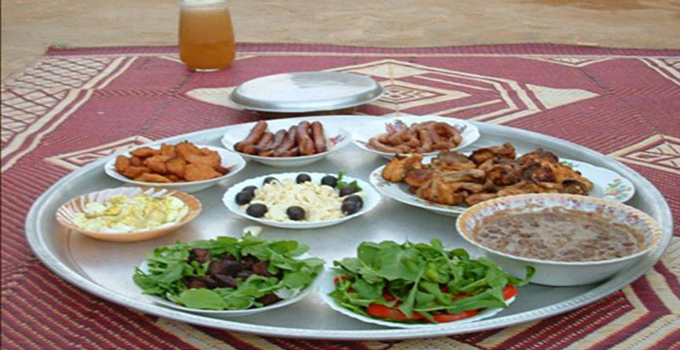
Who says you cannot be healthy if you’re fasting for an entire month?
You can eat healthily and feel good during an entire month of fasting provided you follow the right methods. The Holy month of Ramadan has begun this week and I have been fasting regularly for over two decades during Ramadan.
Considering the heat wave that is still on in the city with no rains as yet, one has to be extra careful and prepared about what to eat during the non-fasting period, so that you can maintain your health, fitness, endurance and flexibility during the entire month.
Fasting during the month of Ramadan or any other religious months/period can be good for your health if it’s done correctly. All changes happen in the body system during fasting (starvation). Stored nutrients, especially muscle proteins are broken down to provide fuel to our body. Fasting diet lacks in macronutrients like carbohydrates and fats which leads to weakness. In order to avoid this having healthy options of food during fasting is very important.
A person who is fasting needs good and nutrient-rich food which will help to maintain the energy levels in our body on a day to day basis.
Here are few tips for healthy eating options while Ramadan or any other holy fasting period.
Go with Natural food, Not Junk or Processed Foods:
Well, in today’s time processed foods might come across as a very convenient option, but they’re usually filled with unhealthy things like high-fructose corn syrup that leads to overconsumption. Secondly, contains a lot of artificial Ingredients. Most processed foods are Low in Nutrients.
It requires less energy and time to digest processed foods. Processed foods contain MSG (Monosodium glutamate – to enhance flavour), it also contains lots of sodium and typically all the wrong heart-clogging oils. Therefore it is always good to go with natural food available if possible go with homemade food.
Don’t break your fast with a feast:
Be Careful. If you are not careful, the food eaten during the pre-dawn and dusk meals can cause some adverse effects. Those observing the fast in Ramadan month should have at least two meals a day, the pre-dawn meal (Suhoor) and a meal at dusk (Iftar).
The way to approach your diet during fasting is similar to the way you should be eating outside of the Ramadan month. It should contain foods from all the major food groups:
– Fruit and vegetables
– Bread, cereals and potatoes
– Meat, fish, or alternatives
– Milk and dairy foods
– Foods containing fat and sugar
Hydrate Your Body:
When we fast for long hours, our body gets dehydrated over the course of the day. During the non-fasting period, we should take care of the hydration levels in our body. After a long day of fasting, it’s difficult to drink a lot of water or have lots of water-based food items. But, we can have fruit juices and soups made with veggies to give our body the additional water it needs. A great way to break the fast is with ‘Dates’. Also consider having coconut water, or making smoothies, coolers and fruity drinks which are super-hydrating.
Wholesome foods during Ramadan:
Suhoor- the pre-dawn meal should be a wholesome and moderate meal that is filling and provides enough energy for many hours. Ideally, it should be slow digesting food like salads, brown bread, cereal (especially oats) so that your body will get energy for a long time constant. Also, you can have some fluids with vitamins, such as fruit and vegetable juice.
It’s customary for Muslims to break the fast (Iftar) with some dates. Dates provide a burst of energy. Fruit juices also have a similar, revitalizing effect. My favourite, of course, is “FALOODA”. Start by drinking plenty of water, which helps rehydrate and reduces the chances of overindulgence.
SOME QUICK TIPS: What to have and What to avoid:
Foods to avoid
– deep-fried foods, for example, pakoras, samosas and fried dumplings
– High-sugar and high-fat foods, including sweets such as gulab jamun, rasgulla and balushahi
– High-fat cooked foods, for example, parathas, oily curries and greasy pastries
– Fatty meats, Liver and organ meats, Hotdog and sausages, large amounts of prawn, shrimp and shellfish
– Whole milk, Ice cream and whipped cream, full cream yoghurt and labneh, Full cream cheese especially yellow cheese, Creamy and cheese sauces
– Coconut (the only fruit rich in saturated fats that are unhealthy for the heart), Fried vegetables, Boiled vegetables with butter, Juices with added sugar
– Pastries that contain large amounts of fat (doughnuts, croissants, Danish pastries), Fried rice, Fried potato chips or French fries
Healthy alternatives
– Baked samosas and boiled or steamed dumplings
– Chapattis made without oil
– Baked or grilled meat and chicken, Fish, Grilled or boiled skinless chicken, Lean veal or lamb, moderate amounts of prawns, Legumes such as beans, lentils, and peas, eggs
– Milk-based sweets and puddings such as rasmalai and barfee, skimmed or low-fat milk, skimmed or low-fat yoghurt and labneh, Low-fat cheese
– All fresh vegetables, boiled, baked, steamed or cooked with a little oil, Seasoned vegetables or vegetables with lemon juice or a little oil, Fresh fruits and natural fruit juice (in moderation)
– Brown bread, Plain spaghetti or rice (without ghee or high fat sauce), Grains with no added fat, Baked or boiled potatoes
Healthy cooking methods
– Shallow frying
– Grilling, Roasting, Steaming or Baking is healthier and helps retain the taste and original flavour of the food, especially with chicken and fish.
May everyone who observes the blessed month of Ramadan or other holy fasting period have a peaceful, healthy and happy time with family, friends and community.
Please consult with your physician regarding fasting or consuming any particular foods before doing so.



